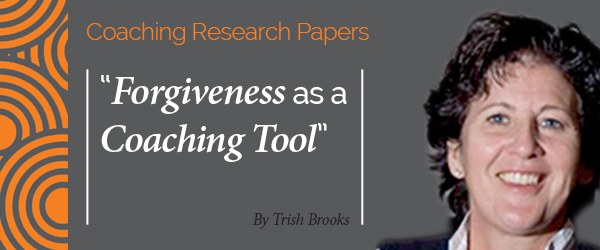Research Paper By Trish Brooks
(Executive Coach, CANADA)
Abstract:
Forgiveness is a powerful coaching tool that is often underutilized. When people are wronged they may be reluctant to offer forgiveness because of misconceptions that they hold. For example, many people believe that when you forgive someone you are condoning their behavior, or you are demonstrating weakness. However, not forgiving can leave a person with negative feelings such as anger and resentment as well as physical problems such as heart disease. Coaching can help a person reach a new understanding about the nature of forgiveness and its benefits. Forgiveness can reduce anger, depression and stress and leads to feelings of hope, peace, compassion as well as physical health.
Forgiveness as a Coaching Tool
Statement:
Forgiveness is a powerful (potentially underutilized) coaching tool for moving a client forward.
What is forgiveness?
Forgiveness is the process of concluding resentment, indignation or anger as a result of a
perceived offense, difference or mistake, or ceasing to demand punishment or restitution.
(Wikipedia, 2012).
Psychological and Physiological Effects of Holding a Grievance
The inability to forgive someone can have negative physiological and psychological consequences. Most people are very familiar with the psychological effects of anger, resentment, anxiety, depression, lower self esteem, increased cynicism, and feelings of hopelessness.
Resentment is like drinking poison and waiting for it to kill your enemy.
Nelson Mandela.
Hate is like an acid. It destroys the vessel in which it is stored.”
Andrew Carnegie (1890).
What is less known is that there are physiological effects of holding onto a grudge such as rising blood pressure, surging adrenaline, and rising levels of cholesterol in the blood. In 2011 fortyfour studies were published in the Journal of the American College of Cardiology1 that found a link between negative emotions and heart disease. Chronically angry adults with no history of heart trouble were 19% more likely to develop heart disease than their less angry peers. Forgiveness can improve psychological and physical health. Research from the Mayo Clinic (2011) found that forgiveness lowered blood pressure, decreased symptoms of depression, and was associated with lower risk of alcohol and substance abuse. A study (Luskin et al, 2001) found a relationship between reviewing hurtful memories and measures of the stress response (increased heart rate, blood pressure). When participants were encouraged to think of forgiving thoughts, the stress response was diminished. A study of 108 college students (Luskin, 2004) found similar results. These are just two of many studies that have found emotional and physical benefits of forgiveness.
Why is it so hard to forgive?
If anger and resentment have such negative consequences, and forgiveness has such positive outcomes, why don’t people forgive? One reason is that people hold beliefs that stop forgiveness from happening. Coaching can bring awareness to these beliefs and make it possible for the client to forgive. Some of the beliefs/statements that get in the way of forgiveness are:
Are there some things you can’t forgive?
Anything can be forgiven because forgiveness is not about the other person; it is about bringing peace to oneself. People have forgiven the most horrific acts imaginable. For example, it would seem difficult to forgive someone who murdered your child. However, a Google search on that topic will reveal many stories of people that have done just that. Katy Hutchison describes how she forgave her husband’s murder in her book Walking After Midnight.
